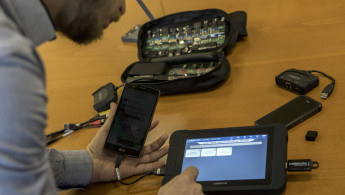Israeli intelligence firm hacked phone at Saudi Arabia's request, report claims
The report clims that in November 2019, the Cellebrite representative flew from London to the Saudi capital where he was picked up by a government official.
At Cellebrite's request, the employee did not have his passport stamped at the border or have the electric equipment he was carrying checked.
He was taken straight to a hotel room, in which the Saudis were not allowed to have put any cameras, and where the employee hacked into a Samsung mobile phone and copied over its information before heading back to the airport and returning to London.
Cellebrite is thought not to have known the identity of the Samsung S10 phone it hacked.
While it is likely that Cellebrite was assured by Saudi authorities that the possession and hacking of the phone was lawful, the nature of the Saudi regime - who just a year previously had murdered journalist Jamal Khashoggi after hacking his phone - would have been known to the company.
Twitter Post
|
As previous investigations have shown, other Israeli firms have provided hacking or surveillance services to the Saudi government, however Cellebrite is the only company which is thought to do so without supervision from Israel's defence ministry.
Pegasus spyware, developed by Israeli tech firm NSO, is known to be used by Gulf and other regimes to hack the mobile phones of dissidents and other opponents.
In August it was revealed that the Israeli government has been encouraging and officially mediating in the lucrative sale of Pegasus software to Gulf regimes.
The software can copy the contents of these devices and sometimes even control the camera and audio recording capabilities.
The reason for this evasion of control is due to Cellebrite until recently did not register itself as an exporter of security services.
The company, which is now under supervision from the economy ministry, claims to serve police and security forces in 150 countries.
Reports have alleged that Cellebrite was involved in aiding Hong Kong and Belarussian police in their crackdowns on pro-democracy protesters.
The revelations come just weeks after Israel and Saudi Arabia's close ally the UAE signed a security cooperation deal following their decision to fully normalise diplomatic relations.
It is speculated that Saudi Arabia may soon follow suit, however it is known to have already cultivated deep-running covert ties with Israel, including over security matters.
Follow us on Facebook, Twitter and Instagram to stay connected





 Follow the Middle East's top stories in English at The New Arab on Google News
Follow the Middle East's top stories in English at The New Arab on Google News


